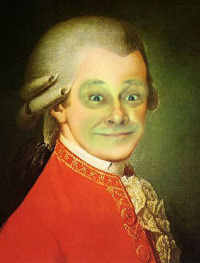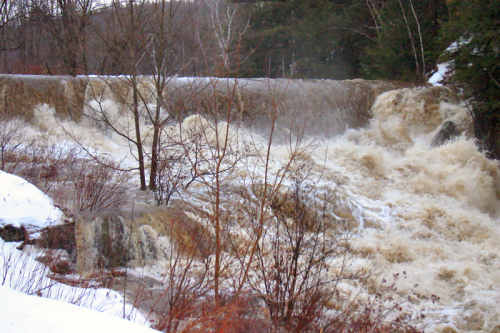A 365-Day Project
"We Are All Mozart"
A project to create
new works and change
the perception of the
music of our time.


 June 11, 2006
June 11, 2006 
I shouldn't be impolitic. Quantity and quality are unrelated for some composers, and even inversely related for others. This "We Are All Mozart" project is about making a point, which includes my feeling -- a feeling, not a historically informed thesis -- that our general lack of compositional productivity is within life's terms a choice, not a condition, and it affects visibility and public opinion.
The choice itself is not good or bad. No criticism is implied. There's no component of judgment, save for how composers themselves feel about their own life choices. And as I'm learning from the surveys, external factors loom large for contemporary nonpop composers -- often much larger than inspiration or the depth of the well of ideas. Sometimes the choice is indeed forced.
As I was working out the original survey questions (reprinted here), I wondered how it was that the finest film music composers could create dozens of pieces a year, hundreds of cues (such as John Williams, with over 20 film credits in 2005 alone). There are thousands upon thousands of cues in his or any major film composer's career, many cues with the artistic interest of a movement from any nonpop composer's repertoire. Are they bad? Is the body of clichés, as I wrote about the other day, so great that little original art is made during the process of film composition? Is the size of the support staff -- orchestrators and copyists -- large enough that they become like a Reubens studio? Composer William Rowland wrote, "Reubens sketched out the painting to be; then maybe painted a few strokes, turned it over to his employees who filled in the details and when they were finished---he did the final finishing and signed his name."
It sounds like inspiration at work, no? Reubens's ideas, sketched, started and executed? Could our nonpop composers work that way, handing off their inspired sketches to a team? Don't they already, with scoring software and midi input at their fingertips? Rowland, who presently composes about an hour's worth of orchestral music a year, thinks so: "If I had a staff to take down dictation and orchestrate, etc., ... there are no limits." In the nearly-no-limits department already is Carson Cooman, who averages 100 compositions a year. (I'll report what Carson has to say in the near future.)
Although I'm relatively prolific, I am dissatisfied with the available minutes to set down ideas. Like most composers, I'm constrained by extramusical work, in my case as a writer, editor, engraver, teacher, programmer, audio restorer, etc., plus as an advocate for new nonpop that voraciously consumed whole days during ten years of Kalvos & Damian. (And then I started this blog. Fool!)
By contrast, composer John McGuire, reports to composing "one-third to one-quarter of a piece in an average year. Last year was an exception; I finished half of a composition, plus an as-yet-undetermined percentage of another composition."
I know John's music -- and if you don't, listen right away! -- and understand that each is a singular work of brilliance unlike anything in the nonpop repertoire. It was our pleasure, my wife Stevie and I, to hear Beth Griffith rehearsing John's A Cappella in our living room in preparation for performance at the Ought-One Festival in 2001. Could he create more of this wonderment? He writes, "More composition might be possible if there were fewer of the traditional hassles: financial worries, general noise level. However, I have been in situations where these kinds of hassles were reduced to near zero for months on end and production didn't necessarily improve that much."
John is a composer who commits at least four solid hours a day to writing music, with pen and pencil and ruler and large sheets of paper. Would my quest for visibility for nonpop composers be a curse for this Vermeer of nonpop, who has composed fewer than 20 works in 40 years, some stretching across half a decade for their composition? Apparently not. John isn't threatened by the idea of productivity. Indeed, he refers to Art and Fear by David Bayles and Ted Orland as an extant validation for the "We Are All Mozart" project itself.
Yet it's hard to separate the project from the implicit judgment it suggests: "Compose more! More is good! Much is better!" Yes, more is good -- for visibility, for quantity in a consumption society, for a cheap proof that we're not an entire class of slackers. But if it's not what you do as a composer, then don't do it. On the other hand, if constrained time and low visibility (and concomitant absence of audience feedback), and the inability to trade your skills for an appropriate income trouble you deeply (as they do me) and these forces leave you with an lengthening scroll of incomplete sound unwrapping before your eyes and continuing to the horizon, then you may understand whence the concept arises.
(I'm justifying again. I call feel myself trying to pull away from writing the words.)
Let's go back to John Williams for a moment and keep in mind that aside from composing, he meets with producers and directors, previews the scenes, conducts the scores, conducts other groups (such as the Boston Pops for 13 years), gives interviews and writes articles -- and composes concert music, such as his well-received 1998 song cycle Seven for Luck. What accounts for this? Sheer determination? Talent? Genius? Practice? Cliché? Theft?
I'm not a Williams fan. But he is the archetypal prolific composer à la Mozart, writing within a coherent style for an audience with a limited range of expectations and a common language. He and his film colleagues (and some of the often-played, prolific minimalists nonpoppers) appear to untangle one of the mysteries of productivity. David Froom writes, "I believe the thing that makes us slower is the lack of an accepted international language. We work at a time when we can embrace almost any musical language we choose, but then our pieces have to follow our personal aesthetics, which evolve as we grow, and our pieces have to be written to decipher themselves for the audience."
Thank you, David. I'm beginning to understand.
It's raining again. High water is slamming over the dam behind the house. The state is supposed to take the dam down next year, restoring the brook to its original course. The dam never achieved its purpose, because it was finished just in time for the flood of 1927 to wash the mill away, leaving only the abandoned concrete structure. It's cracked now, held in place by silt and rebar.
